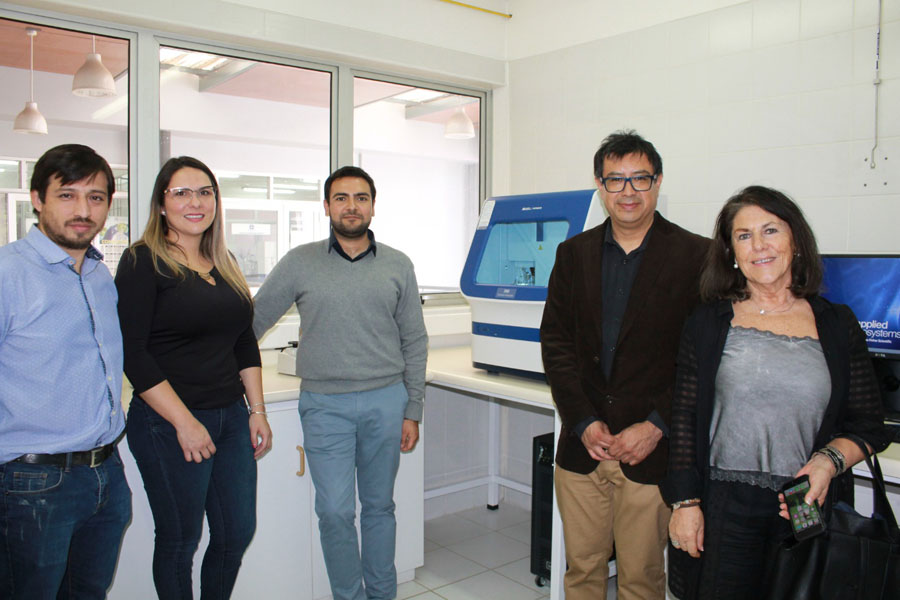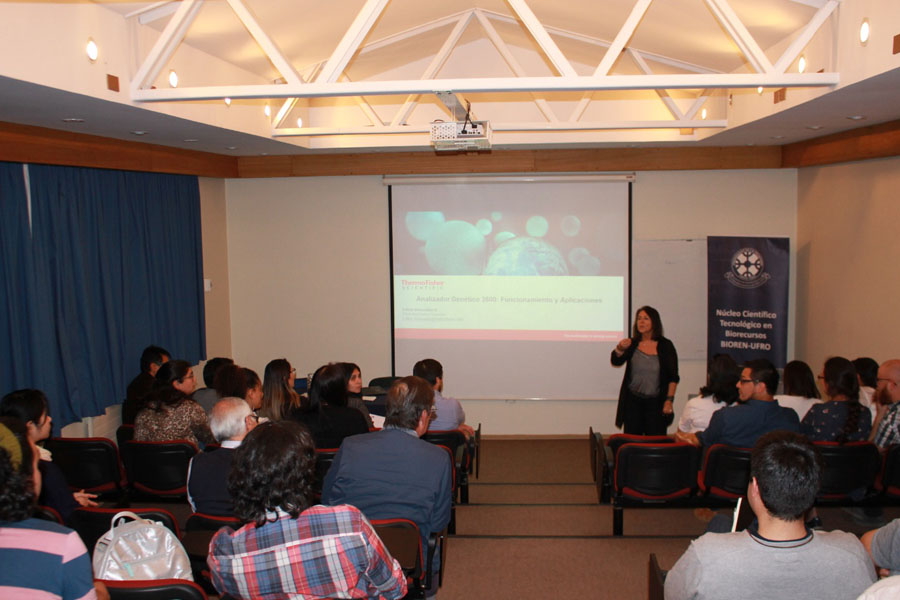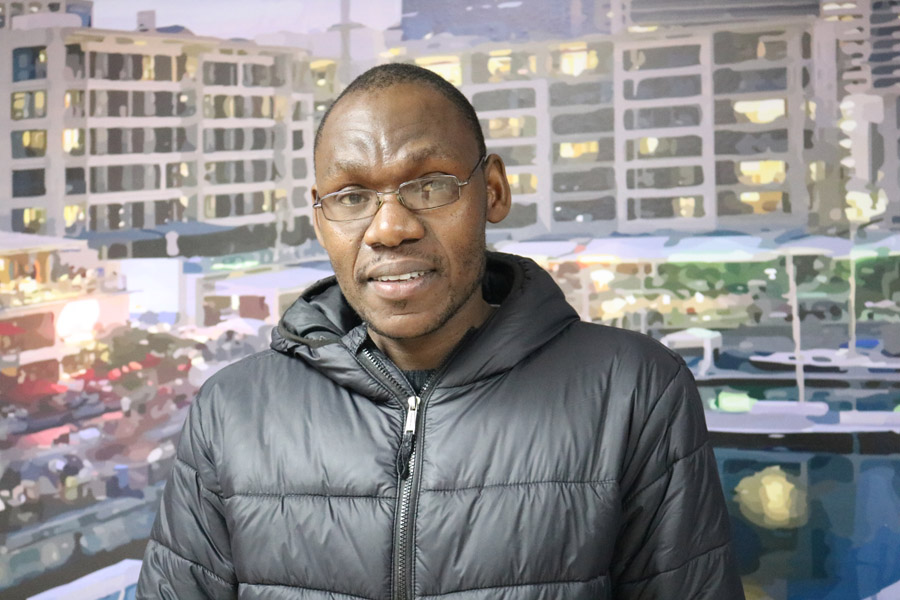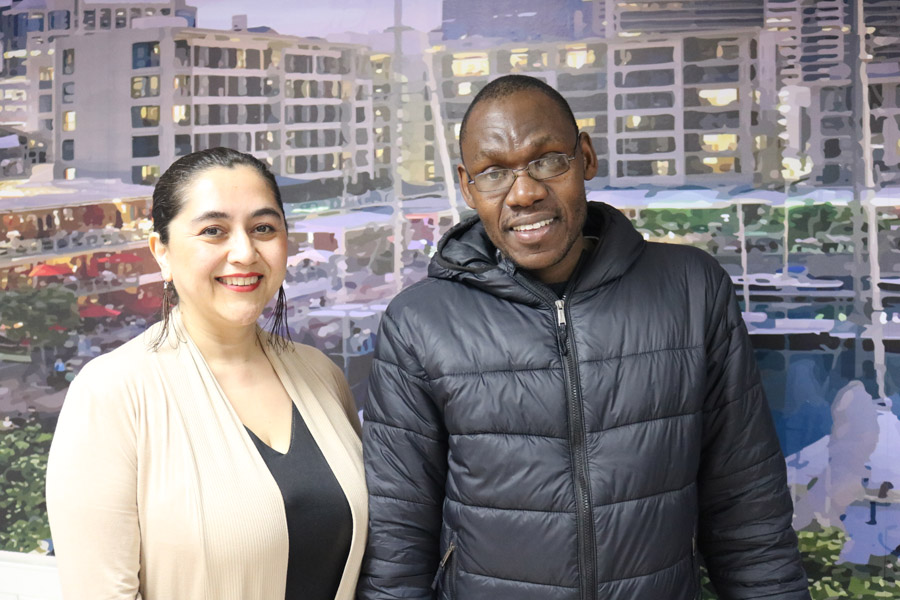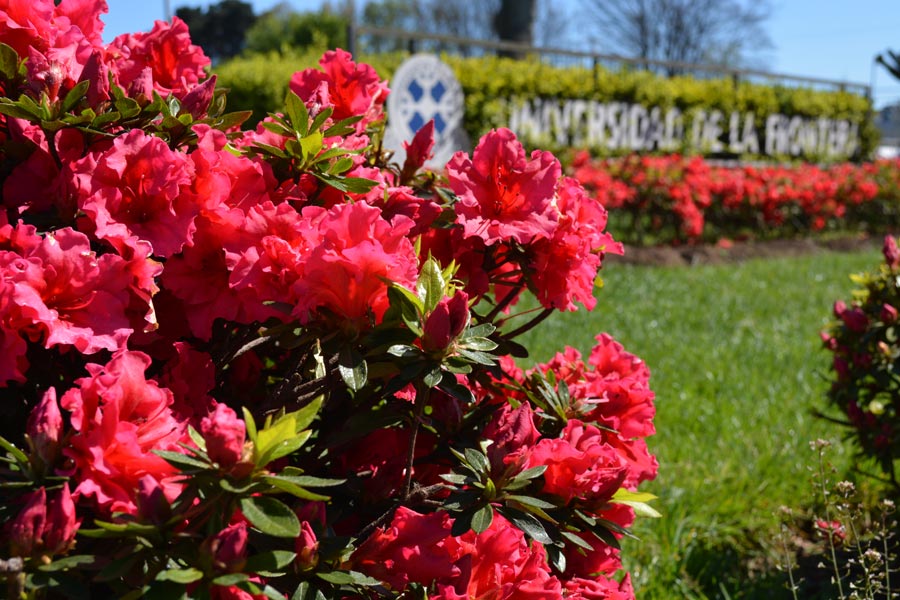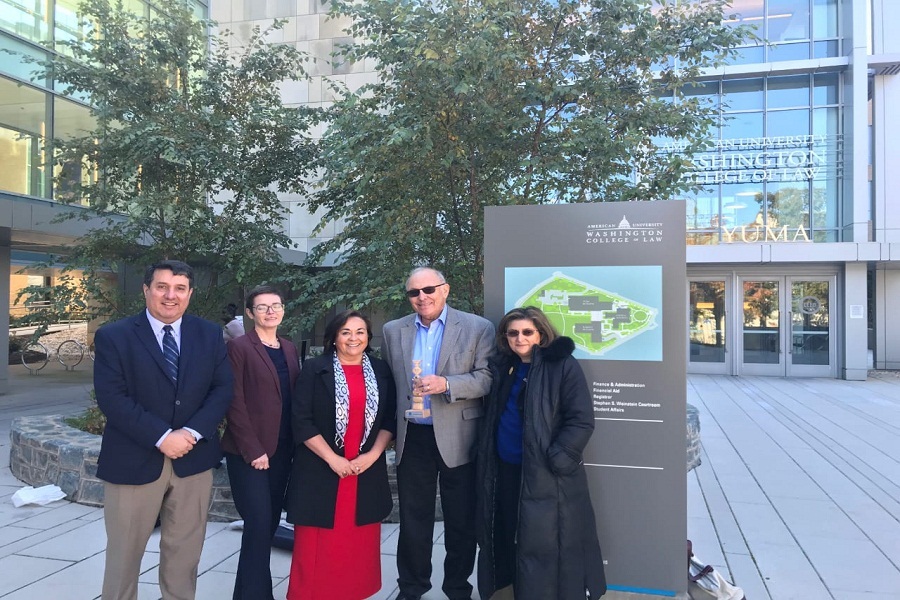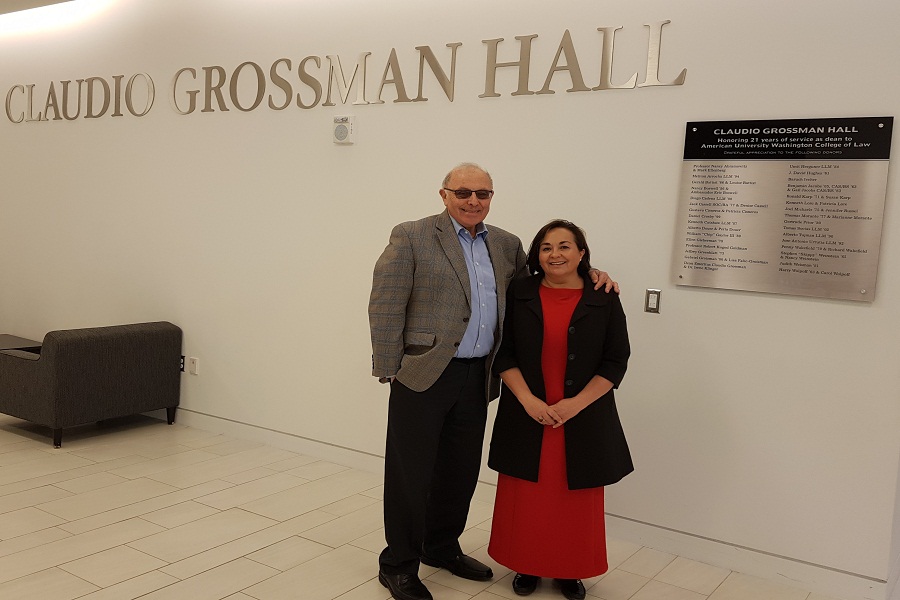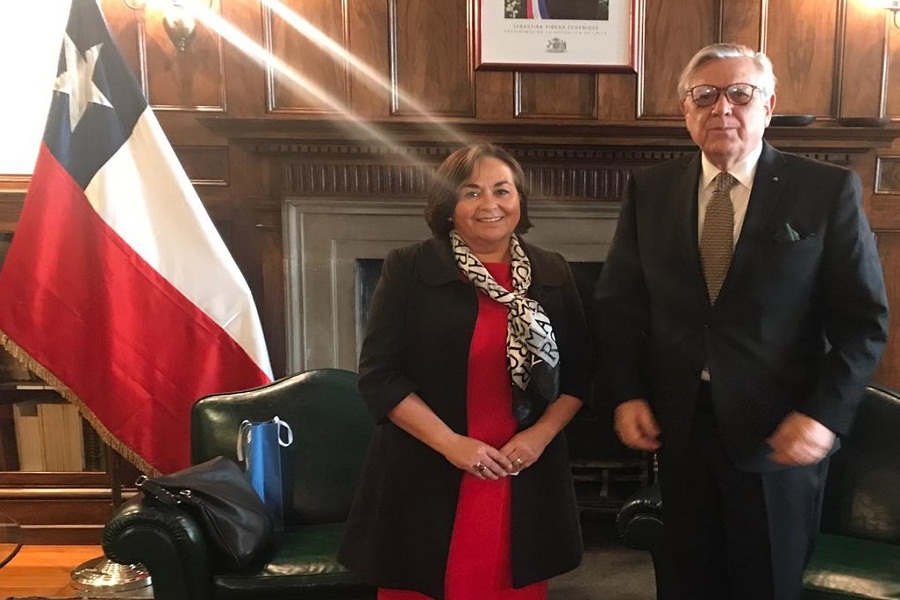|
The FONDEQUIP Project of CONICYT allowed the UFRO to acquire a Sanger Sequencer (genetic analyzer, model 3500) for bioprospecting of organisms in extreme environments in Chile that will allow the NEXER project to continue research in the field of molecular biology. |
It is a positive impulse for scientific research at the Universidad de La Frontera and for its Scientific and Technological Bioresource Nucleus (BIOREN) and the Network for Extreme Environment Research (NEXER). They were awarded with a FONDEQUIP project (EQM170171) that allowed BIOREN to be equipped with the latest technology.
“This equipment is a very useful and versatile tool for microbiology, as well as for research in the fields of cancer, biomedicine, engineering, and molecular biology. It will be available immediately, for different kinds of use, for the group of researchers who are part of BIOREN and the UFRO,” Dr. Milko Jorquera, professor at the Department of Chemical Science and Natural Resources of the UFRO, said, and commented that the equipment will be necessary to work in molecular biology and biotechnology. It will also put a focus on innovation regarding the NEXER Project, which is led by the Universidad de La Frontera. Dr. Maria de la Luz Mora, director of BIOREN, is also part of the challenge. She explained that the Sanger Sequencer 3500 will “strengthen the ohmic science and its scientific processes for undergraduate and postgraduate students that are related to this field, but mainly, it will strengthen the link with the productive sector, because it is an equipment that has to be handled directly, with versatile fields of use, and low-cost applications.” This translates into concrete results, such as animal genotyping or forensic medicine, among other progresses. “The UFRO started to grow when it got in contact with the productive sector and, in this context, we have to keep participating in services which are the basis for applied projects and which allow us to achieve a better link and efficiency regarding the necessities of the community, with a more specific analysis, which bioresources is working on,” the BIOREN-UFRO researcher explained. The Network for Extreme Environment Research, NEXER, is a network of three Chilean universities (U. de Antofagasta, U. de Magallanes and U. de La Frontera) and they are developing interdisciplinary research in genetic
Written by: Communications Office
This email address is being protected from spambots. You need JavaScript enabled to view it. |
|
His name is Alfredo Mabica and he is a postgraduate student in the Master’s Program in Education at the Universidad de La Frontera. After an intensive preparation at the Language Coordination Center, CODI-UFRO, he developed a very good command of the Spanish language and now he is waiting for the results of the international accreditation exam at the Instituto Cervantes in Spain. |
Chile, and especially Temuco, were unknown territories for Alfredo Mabica who comes from Mozambique in Africa and has been working as a chemistry teacher at a secondary school when he received the news that he was chosen from 15 applicants to receive the scholarship “Nelson Mandela”, which the Chilean government offers to strengthen the training of human capital through Master’s Programs at different universities. Faithful to his vocation as a teacher Alfredo arrived at the Universidad de La Frontera, thanks to the coordination of the International Affairs Office, in order to join the Master´s Program in Education, an experience the Mozambican student sees very positive because of the learning quality, and because of which it turned into a necessity to improve his Spanish language skills, although he already understood vaguely, since it is very similar to his native language, which is Portuguese. “At CODI they helped me a lot to improve my Spanish language skills. It was difficult at the beginning, but necessary for understanding the teachers and my postgraduate classmates,” Alfredo, who also went through a rough process of acclimatization in his first international experience, because of the cold climate and rain of the south, commented. Margot Godoy, director of the Language Coordination Center, which is part of the Vice-rectorate for Undergraduate Affairs, explained that this action that emanated from the collaborative link with the Academic Office for Graduate Studies permitted Alfredo to take part in an intensive Spanish program that was considered by the “Nelson Mandela” Scholarship with two hours of Spanish per day during the first semester, for being able to pass Spanish level B1, which is a requirement for international students at the UFRO. “It was rewarding to see him study. We saw the advances in him and the necessity of learning the Spanish language well for getting an international certificate. He got prepared for the DELE exam of the Instituto Cervantes at the beginning of October, being the first exchange student who takes this exam, and we are expecting good results,” Margot Godoy explained. While he is waiting for the results of the exam that accredits his Spanish language skills, a certificate provided by the Ministry of Education and Professional Training in Spain, Alfredo continues with his postgraduate studies at the UFRO with the objective of applying the contents he learns at this prestigious Chilean university in the future and, why not, of teaching the Mozambican students the Spanish language.
|
|
Life-sciences, and preclinical, clinical and health sciences are the outstanding fields of the UFRO according to THE Rankings |
The UFRO is in second place at the national level – first place regarding the regional state universities – among the seven Chilean universities that have been judged regarding the second field mentioned above, which includes programs such as medicine, nutrition, nursing, etc. The Universidad de La Frontera keeps getting positive results regarding its work. Apart from the previous rankings and, of course, the recent accreditation for six years by the National Accreditation Committee CNA, today, the Times Higher Education Ranking (THE) again positions the university in prestigious places at the national level, regarding two fields of interest: Life-sciences and preclinical, clinical and health sciences. The UFRO is in second place at the national level, after the University of Desarrollo, and in first place regarding the regional state universities, among the seven Chilean universities that have been judged regarding the second field mentioned above, which includes programs such as medicine, nutrition, nursing, etc. The THE classification table for preclinical, clinical and health sciences uses the same rigorous and balanced range of 13 performance indicators as the World University Rankings. The methodology has been recalibrated to suit the individual fields. The outstanding universities are the leading ones in medicine, dentistry and other health subjects. The other field, life-sciences, positions the UFRO in fifth place out of nine outstanding Chilean universities in that field, which have been judged. This category considers universities that are leading across agriculture and forestry, biological sciences, veterinary science and sport science subjects. The THE classification table for life-sciences uses the same range explained above, but the methodology has been recalibrated to suit the individual fields. At the same time, the Universidad de La Frontera is among the first 600 universities overall according to the latest THE Rankings report by subject 2019: range 401-500 in preclinical, clinical and health sciences and range 501-600 in life-sciences.
Written by: Instituttional Analysis and Development Office
|
|
The Chilean National Fund for Scientific and Technological Development (Fondecyt) awarded 12 projects of the Universidad de La Frontera, what puts it in seventh place among the universities across the country with the highest number of projects awarded in different disciplines, such as biomedical sciences, engineering, agronomy, psychology, history, geography, urbanism, etc. |
The Universidad de La Frontera received the results of the Fondecyt Initiation Competition 2018, which will finance 12 projects with a total of 885.866 million Chilean pesos, as a positive impulse for the scientific output, which is coordinated by the Vice-Rectorate for Research and Graduate Studies. These funds will allow the scientists to develop advanced research in the fields of medicine, biology, agronomy, psychology, biomedical sciences, geography and urbanism, engineering, history and mathematics. This year, the UFRO is in seventh place at the national level among the universities with the highest numbers of projects awarded by Fondecyt, above other historic institutions with an advanced development in research and innovation, such as the University of Valparaíso, University of Talca, and University of Santiago de Chile. “The submitted projects awarded by Fondecyt are of vital importance for the university as well as for the academic development of each researcher who submitted a project. In this competition, although the number of awarded projects is lower than last year, the percentage of approbation stays above 30 percent, since there have been less projects submitted this year. That means that the academics have been working in a detail-oriented way and with high standards of excellence. This is what our university is searching for,” Dr. Renato Hunter, Vice-rector for Research and Graduate Studies, explained. The academic authority also emphasized the high number of awarded projects at the UFRO compared to other institutions in Chile who are an example in research, and among which you can note an increase of private universities regarding the approval rate. Another fact Dr. Hunter pointed out is the high incidence of young UFRO researchers in the results. “Given the fact that the employment of new academics undergoes a strict selection process in which different university requirements are involved, results like this show that it has been the right way,” he said. For Dr. Cesar Arriagada Escamilla, the director of Research at the UFRO, there is no doubt that the results of this Fondecyt competition “confirm the efforts made by the academics and researchers who developed project proposals of very high quality and with a scientific productivity that has been maintained over time. Only 30.8 percent of the submitted projects in Chile are awarded in this competition, and our researchers are among the best”. Besides, he said that: “We also have to emphasize the gender parity rate, since 6 female researchers have been awarded this Fondecyt grant”. All of the projects are of high impact and transversal in their fields of knowledge. The execution of these projects starts immediately in November, after signing the agreement with the Chilean Council for Science and Technology (CONICYT). “Now, the purpose as an institution is to keep facing the challenge of developing research with excellence, to transfer the knowledge that is created at this institution to undergraduate and postgraduate students, and to motivate the young generations,” Dr. César Arriagada Escamilla, director of Research at the UFRO, explained. CLICK HERE TO SEE THE PROJECTS 2018 Written by: Communications Office
|
|
The American University Washington College of Law (AUWCL) and the UFRO Faculty of Law and Business (FCJE-UFRO) created a work agenda 2018-2019 within the framework of their cooperation agreement. |
In accordance with the institutional directives of the Universidad de La Frontera and the Strategic Development Plan of the Faculty of Law and Business, Valeska Geldres, the dean, went to Washington D.C., USA, for a series of activities. One of these activities was the establishment of a work agenda 2018-2019 for the American University Washington College of Law (AUWCL) and the UFRO Faculty of Law and Business (FCJE-UFRO) within the framework of their cooperation agreement. INSTITUTIONAL VALUES This is an important alliance and improvement regarding internationalization, thanks to both faculties who shared their interdisciplinary and intercultural values because of which international outreach and diversity, which define both institutions, have been the main topics during the conversations of the university authorities. One of the results is that, in April 2019, the dean Camille Nelson is going to visit the UFRO in order to give start to the new academic year at the FCJE-UFRO. Dr. Claudio Grossman, dean emeritus at AUWCL and agent of Chile in The Hague (Netherlands) will also soon come to the UFRO, in December 2018, for a conference about the recent judgment regarding the Bolivian demand for access to the Pacific Ocean before the International Court of Justice in The Hague. Another activity were the conversations with Padideh Ala’i, director of the International Legal Studies Program, and Melanija Radnovicla, director of the International Student Mobility Program, for the development of activities within the FCJE-UFRO Internationalization Program. The idea is that the activities within this international cooperation agreement will be a support for the FCJE-UFRO Program, with short international courses and for the attraction of North American students and academics to come to the Faculty of Law and Business at the UFRO. GREAT PROGRESS Another part of the agenda of Dr. Valeska Geldres was a meeting with Gonzalo Rivas, the Chief of the Division of Science and Technology at the Inter-American Development Bank. The objective of this meeting was to show him the activities of FCJE-UFRO and to get to know the priorities of the bank in Latin-America. Another important meeting was with Cecilia Fernández, the executive director of EVERIS USA, in order to analyze possible alliances in the field of social sciences, related to technological challenges. The activities in Washington D.C. ended with an official meeting with Alfonso Silva Navarro, the Chilean Ambassador in the USA, where she shared the great news of the recent Institutional Accreditation for 6 years that the UFRO achieved and of the university’s incorporation into the group of universities of excellence in Chile. Valeska Geldres emphasized the importance and result of these institutional visits: “To find a partner such as the Washington College of Law in the USA is absolutely great, because we share a comprehensive view of the legal and business field, as well as our mission to train professionals and postgraduates of excellence, with academic quality, a global vision, entrepreneurship and social responsibility. Besides, it is important that Dr. Claudio Grossman, who joint this cooperation project and is going to visit us in December, is part of this agreement. We hope that we are able to keep moving forward with the development of projects that allow us to offer more opportunities to our students.”
 Written by: Communications Office Written by: Communications Office |





